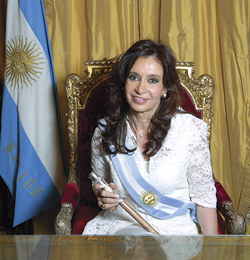Vol. 233 No. 8
KURT ABRAHAM, EXECUTIVE EDITOR
|
Argentina’s president turns up the rhetoric
|

|
It is a shame to see what is going on in Argentina. This proud nation with a rich history of accomplishment has endured chronic economic troubles over the last 20-plus years, but now it also seems to be suffering from incompetent, bellicose leadership. And the effects reverberate all the way into the oil and gas sector.
At the center of a growing governmental hurricane is Argentine President Cristina Fernández de Kirchner. At first glance, her track record gives no hint of the controversial figure that Fernández has now become. She was elected president in October 2007 without a run-off, succeeding her husband, the late Néster Carlos Kirchner Ostoić, who was president from 2003 to 2007.
Fernández graduated from National University of La Plata, where she met her husband. They subsequently moved to Santa Cruz province, working as lawyers until Fernández was elected to the provincial legislature in May 1991. Seven months later, her husband was elected governor of Santa Cruz, a post that he held until elected president in 2003. Between 1995 and 2007, Fernández was elected to several terms in the Argentine National Congress. During Kirchner’s presidency (2003–2007), she served as First Lady before being chosen as the Front for Victory party’s presidential candidate in 2007. She won re-election in October 2011. So, President Fernández and her husband might be better described politically as the Argentine version of Bill and Hillary Clinton.
Unfortunately for Ms. Fernández, she has been unable to solve Argentina’s vast economic problems. While gross domestic product grew 8.9% in 2011, inflation is estimated by independent analysts to have topped 24%—this is on the heels of several years of hyperinflation. Yet, the government lives in denial, reporting the inflation rate as just 9%. Because Argentina has been cut off from international capital markets after defaulting on $100 billion of debt in 2001, the government is perpetu-ally cash-strapped. So, Fernández, in effect, raided the government’s own pension fund in April by borrowing $3.1 billion from the central bank and pensions agency.
Meanwhile, the oil and gas sector is in a shambles. At one time, Argentina was self-sufficient in energy, producing more than 900,000 bopd and over 1.6 Tcf of gas/year. Those days are gone—output has slumped to less than 600,000 bopd and about 1.4 Tcf/year. The country will have to import a record 80 LNG cargoes this year, at about 4.9 MMcfg, each. So, because officials are short of cash, they are attempting to pay “in kind” for some of these shipments, in the form of biodiesel.
 |
| Argentine President Cristina Fernández de Kirchner |
|
All these assorted economic problems left Fernández with few options and plummeting popularity. So, she took a page from the Barack Obama playbook and distracted the public’s attention by creating new issues and controversies. First, she blamed former state firm YPF, a subsidiary of Repsol, for the nation’s net import situation. Fernández then used that as an excuse to seize YPF from Repsol in May and nationalize it. So far, the Buenos Aires regime has refused to compensate Repsol for that seizure. Then, in late May and early June, just after the 30th anniversary of the Falkland Islands War, Fernández resurrected the issue of the islands’ sovereignty, insisting that the United Kingdom needs to hand over that territory to Argentina. She reiterated her demand in a drama-filled speech to the U.N. Committee on Decolonisation on June 14, a move that prompted UK Prime Minister David Cameron to confront her several days later in an angry exchange at the G20 Summit in Los Cabos, Mexico.
This new bellicose tone from Fernández continues to send shock waves through the Argentine economy on all policy fronts, including oil and gas. On July 27, the president gave new, vast powers to the governmental official, who inspired the YPF takeover. She gave Axel Kicillof responsibility for managing investments by the state pension agency in private firms. She also put him in charge of a commission responsible for implementing a new energy policy. This commission can set oil and gas prices, and companies will be obligated to allow auditors to review their books and apply sanctions, if they don’t meet the government’s investment goals.
Kicillof, who was appointed Secretary of Economic Policy and Development Planning (equivalent to Deputy Minister of Economics) by Fernández last December, has been described by critics as a “Marxist economist” or at least having “Marxist tendencies.” The 40-year-old Kicillof encouraged the president to seize YPF and then advocated that Repsol not be compensated for the takeover.
Last, but certainly not least, Fernández announced on July 31 that she has formed a strategic alliance with Venezuelan President Hugo Chávez, for the two countries to cooperate in developing their oil-and-gas sectors through their respective state-run companies. This is akin to the incompe-tents being led by the even-more incompentents—if you like what Chávez has done to ruin Venezuela’s PDVSA, you’ll really love what Fernández will do to YPF.
There is no mistaking the path that Fernández is following. It is most unfortunate, but this is yet another chapter in a wave of nationalism in South America that has yet to fully play out. 
|







